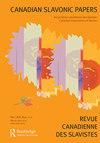De-occupation or (de)colonization? Challenges for Crimea’s future
IF 1.6
Q2 ETHNIC STUDIES
引用次数: 1
Abstract
ABSTRACT This essay focuses on the problem of the decolonization of Crimea within the context of the ongoing Russia–Ukraine war. Both authors agree that the decolonization of Crimea involves a complex intellectual challenge for Ukrainian society and for the rest of the world. For centuries Crimea was a settler colony of the Russian Empire and the Soviet Union. In 2014, Russia resumed its settler-colonial project by means of discrimination against the indigenous Crimean Tatar people, persecution of political prisoners, and mass resettlement of Russian citizens to the occupied territory. Since 2014, Ukraine has rediscovered Crimea and Crimean Tatars. While the general perception of Crimean Tatars has become more positive within Ukrainian society, there is still no agreement on the future of the de-occupied peninsula. While Ukrainian society generally agrees that Crimea should be an integral part of Ukraine, some of the views about Crimea’s future are rooted in the narratives produced by colonizers for the purposes of colonization. This essay shows that military de-occupation does not equal decolonization and that some complicated questions remain unanswered.去占领还是去殖民化?克里米亚未来面临的挑战
摘要本文聚焦于俄乌战争背景下的克里米亚非殖民化问题。两位作者都认为,克里米亚的非殖民化对乌克兰社会和世界其他地区来说是一个复杂的智力挑战。几个世纪以来,克里米亚一直是俄罗斯帝国和苏联的殖民地。2014年,俄罗斯通过歧视克里米亚鞑靼土著人民、迫害政治犯以及将俄罗斯公民大规模重新安置到被占领土,恢复了其定居者殖民项目。自2014年以来,乌克兰重新发现了克里米亚和克里米亚鞑靼人。尽管乌克兰社会对克里米亚鞑靼人的普遍看法变得更加积极,但对去占领半岛的未来仍然没有达成一致。虽然乌克兰社会普遍认为克里米亚应该是乌克兰不可分割的一部分,但关于克里米亚未来的一些观点植根于殖民者为殖民化目的而产生的叙事。这篇文章表明,军事去占领并不等于非殖民化,一些复杂的问题仍未得到解答。
本文章由计算机程序翻译,如有差异,请以英文原文为准。
求助全文
约1分钟内获得全文
求助全文

 求助内容:
求助内容: 应助结果提醒方式:
应助结果提醒方式:


